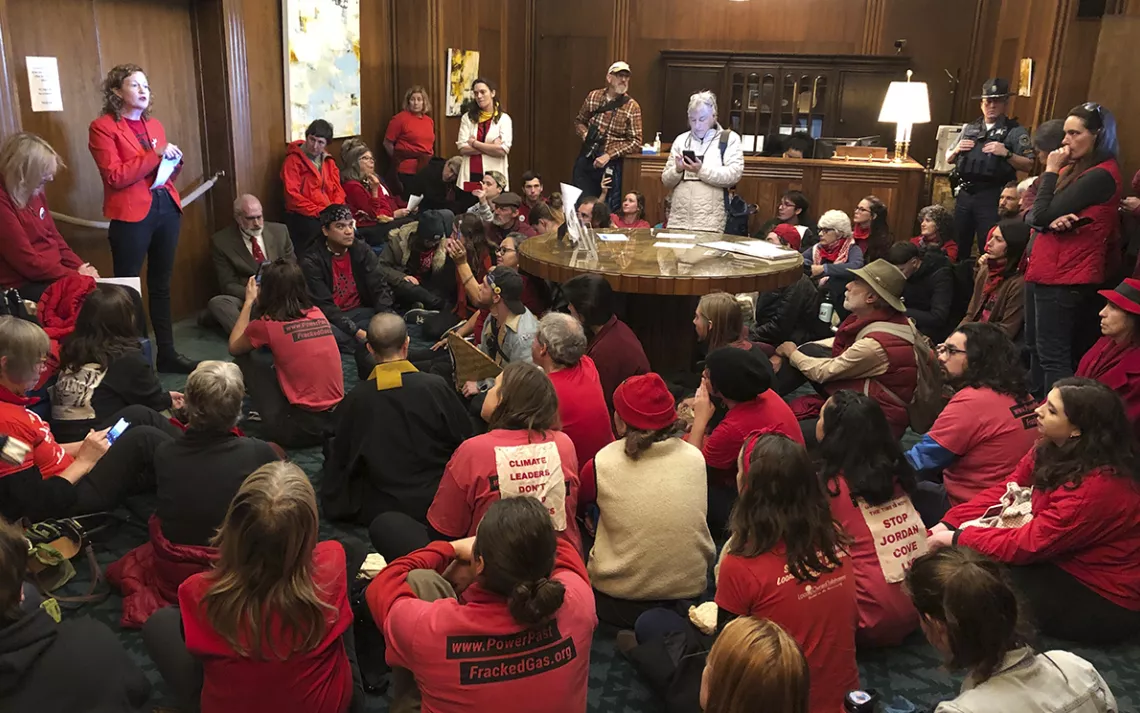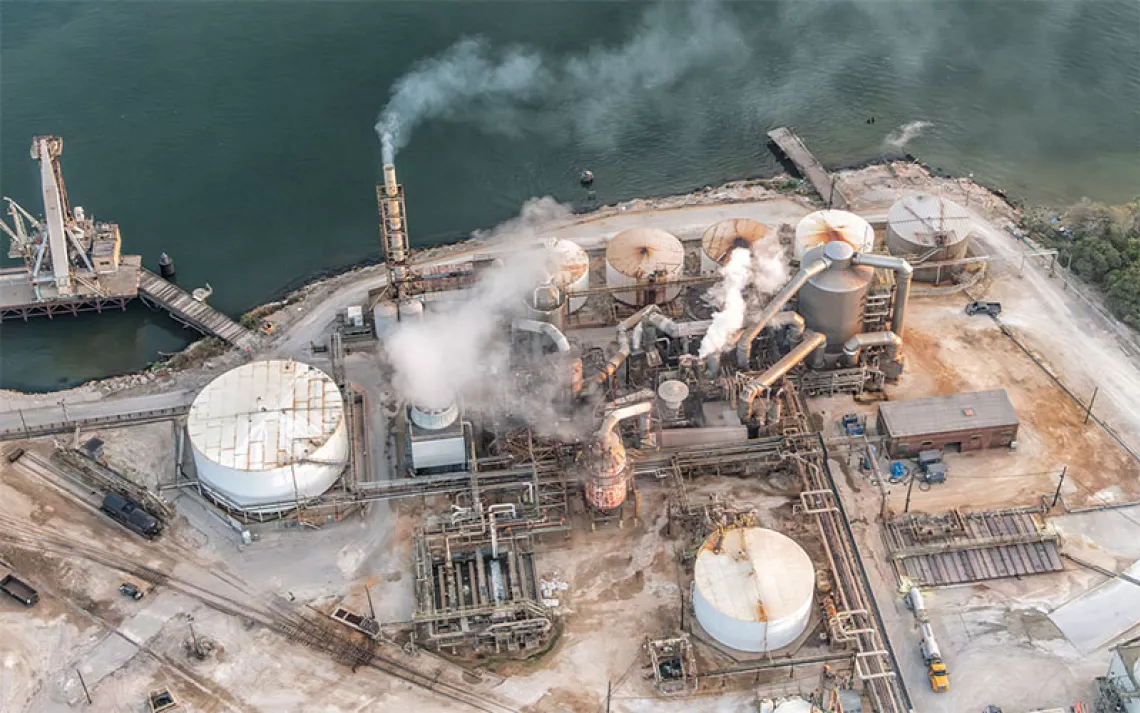Here’s What It Was Like to Get Arrested During an Environmental Protest
Dozens of people demonstrated against a gas pipeline and export terminal in Oregon

Demonstrators at the Oregon statehouse on November 21, 2019. | Photo by AP Photo/Andrew Selsky
Recently, I got arrested.
On Thursday, November 20, I drove to Salem, Oregon’s capital city, from my home in Klamath Falls to participate in a protest the next morning against the proposed Jordan Cove liquid natural gas export terminal and Pacific Connector pipeline—a big, unnecessary fossil fuel project that communities all over Oregon have been fighting since 2017. The pipeline would begin at an existing pipeline in Klamath County, run under the Klamath River (currently slated for a major dam removal project in 2021), and continue through southern Oregon—across the Cascade Mountains and the Pacific Crest Trail—until it reaches the coast at Coos Bay, where a huge facility would turn the gas to liquid for sale overseas.
The Canadian company behind the project, Pembina, has been inundating Oregonians with a bunch of slick ads and trying to act like they are our neighbors—but they are not. They are rich men to whom southern Oregon isn’t even really a place—it’s just a route to get fossil fuels to market. They’re happy to clearcut a 100-foot-wide swathe of forest, including 750 acres of old growth; to dig under or lay their pipe through more than 300 creeks, streams, and rivers; and to counter the expressed wishes of the Klamath tribes and other Native American nations. They’ll do all this to deliver fracked gas to a bunch of buyers in Asia, presumably because doing so will make them even richer. I find their likely motives comprehensible but despicable.
What I don’t understand is why Governor Kate Brown, who pretends to be a big climate change hero, won’t come out against a project that would emit nearly 40 million tons of carbon dioxide equivalent per year. So I went to Salem to demand that she oppose it.
The morning of the rally, I dressed in my bright-red NO LNG T-shirt, with a bright-red blazer on top. I looked in the mirror and decided I needed something else. So on the way to the rally, I stopped at a drugstore and bought a tube of bright-red lipstick. The packaging promised me it would stay on for 24 hours. I would end up testing that claim.
As the big, colorful rally wrapped up, I walked into the foyer of the governor’s office with nine other people from areas that will be impacted by the proposed project. There was a rancher whose land would be seized by eminent domain and who will likely have to witness the salmon restoration project she has dedicated years to be destroyed by the pipeline construction. There were Yurok and Hoopa tribal members worried about threats to drinking water and fish habitat and concerned about the “man camps” that would come with pipeline construction—temporary housing for mostly single men that have been linked to violence against Indigenous women. There was a former Department of State Lands employee with a tie, an encyclopedic knowledge of the permitting process, and a deep love for his home, Coos Bay. There was even a former Oregon secretary of state, Bill Bradbury, among the protestors’ ranks.
As we nervously sat down on the office’s stiff couches, we heard people from the rally streaming into the rotunda of the capitol. They were singing, “We have got the power, we have got the power. We have got the power. It is the hands of us all.” At a time in which our democracy does not always seem to be working “for the people,” hearing that pure distillation of the democratic ideal bouncing off the marble of the people’s building got me right in the chest.
By noon, people began joining us in the governor’s office, dozens of them. They were there for the same reason we were: to make Kate Brown take notice.
About 100 of us occupied that room for nine hours, most of us sitting on the floor, spilling out into the hallway to charge our phones and get some fresh air. During that time, we shared stories and sang lots of songs. We ate pizza. It got really hot in the room with all those bodies. I felt like my emotions were sizzling right at the surface of my skin. When someone talked about being afraid for the future, I felt afraid; when someone talked about being encouraged and feeling love for the group, I felt a surge of love.
At around 8 P.M., Governor Brown came to visit us. Somehow, I found myself speaking directly to the governor of Oregon, and I was shaking with nerves, like an old dryer. “I am here asking you to take a stand against this because you have said to the world that you can be a climate leader,” I told the governor. “And we really want you to be that climate leader. In our hearts, we are so ready to stand behind you and be with you, and all you have to do is something that other governors have already done, which is publicly oppose a project that we all know is the past, not the future.”
I was referring to Governor Jay Inslee of Washington and Governor Andrew Cuomo of New York, both of whom have spoken out against fossil fuel proposals in their states. But Brown wasn’t ready to follow their lead. She heard us speak for about 10 minutes and then left.
Shortly after that, the Oregon State Police told the roughly 75 of us who were still remaining in the office to make a decision: leave or be arrested for trespassing.
I turned to an activist friend and asked, “Would getting arrested really make much difference?”
“Well,” she replied, “we told the governor we weren’t going to leave until she opposed the project. And she didn’t oppose the project. So if we just leave anyway, it doesn’t make us look very serious, does it?”
Nope, I thought, it doesn’t. So I decided to stay and risk arrest.
I had never been arrested before. But that made me a better candidate for engaging in civil disobedience. Here was an opportunity for me to leverage all of my many-layered types of personal privilege for a political good. I am a white, cisgendered, able-bodied, middle-aged, middle-class mom. I look extremely square; I don’t have any tattoos. The police were going to treat me with kid gloves, and I knew it. Still, I was pretty nervous, as were many others.
In the end, 21 of us decided to stay.
We sat on the carpet and held hands. My hands were clammy. Thank goodness one of us was a singer who knew lots of songs. I haven’t sung with such unbridled enthusiasm since summer camp. The police removed us from the office one by one. We sang each person out, not knowing where they were being taken. Even over the singing, we could hear the police place on people’s wrists the plastic zip-tie handcuffs.
When it was my turn, they zipped on my cuffs and took me to a card table they had set up near a side entrance to search my pockets and bag up my stuff. Then they escorted me to a paddy wagon, where I found my compatriots.
The police seemed to take their time arresting us all; the first person arrested sat on the bus in cuffs for at least two hours. Then they drove us to the Marion County jail annex and took us off the bus one by one. Inside, our cuffs were cut off. (I couldn’t help but think about the amount of single-use plastic cuffs the country must throw out every day.) We were then searched—rather perfunctorily—and separated by gender. The women were placed into a holding cell with no benches—just thin plastic mats on the floor. By this time it was maybe 1 A.M.
In the cell, we talked and dozed and stretched. We had become a little unit by now.
As I predicted, our privilege was in full effect. A sympathetic cop left our cell door unlocked for a while so we could leave the cell and use the bathroom or a drinking fountain whenever we needed to. Another cop decided not to take our shoelaces, and explained that we were getting special treatment, just in case we didn’t notice. They called us “ma’am” when taking our mug shots. My lipstick, by the way, looked great.
We were charged with criminal trespass in the second degree and finally released a little before 5 A.M. Most of us will return to Salem on December 20 for our arraignment.
Along with having to weigh the inconvenience and discomfort of being arrested, I also had to think about my usual role as a writer, a chronicler of the environment and environmental controversies. In some way, getting arrested marked the climax of a process of personal transformation in which I’ve slowly transformed from an unbiased storyteller to a full-fledged activist. I started writing editorials about environmental topics as early as 2011. In March 2018, I wrote an op-ed opposing this pipeline (along with Don Gentry, chairman of the Klamath Tribes) that was published in The New York Times, so I already was on record opposing this particular project.
Although I had participated in anti-war protests and immigrant-rights protests (and, like many others, I found myself in the streets after Trump’s election), for many years I avoided engaging in environmental protests. I thought that somehow this kept me “legit” as a journalist. But I’m increasingly aware how climate is inextricably tangled up with social forces like colonialism and racism—how it is a matter of justice, not just science and policy. So that distinction between environmental protest and “other” protest felt artificial—even harmful.
I share the sensation that many feel that this particular historical moment calls for a strong showing of public will. I felt called to action by the new scientific reports painting ever more worrisome visions of our shared future. And I felt inspired by Indigenous protestors at Standing Rock and young people all over the world participating in protests and strikes. In a crisis like this, screw being “unbiased.” Trying to be “neutral” about climate change is like trying to be “neutral” about kids dying from cancer.
In that hot, sweaty office—and later, in our chilly, slightly stinky cell, I kept thinking about my own kids. When they ask me, “What did you do to fight climate change?” I can tell them that I did my best with the tools I had.
For me, pushing myself to the next level of activism meant deciding to risk arrest. For others, there might be another path, another way to step it up just a bit. For example, I have a friend who provides free child care for people who want to protest or attend public hearings. That’s not a front-of-the-stage role, but it’s very much appreciated and extremely useful. Everyone has different strengths to bring to the work of environmental advocacy.
I firmly believe that doing something is the “cure” for “eco-anxiety.” And while doing something may feel a little bit hard at first, you might find—as I have—that when you do it with others who have the same fears and the same great love for the world, that the anxiety recedes like a tide. In its place, you may feel a calm determination and even something strangely like joy.
Editor’s note: The Sierra Club only sanctions civil disobedience in very specific, and rare, circumstances, and our publication of this opinion essay is not meant as an endorsement of the November 21 action at the Oregon statehouse.
This article has been modified since publication.
 The Magazine of The Sierra Club
The Magazine of The Sierra Club



